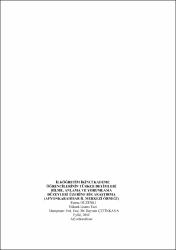İlköğretim İkinci Kademe Öğrencilerinin Türkçe Deyimleri Bilme, Anlama ve Yorumlama Düzeyleri Üzerine Bir Araştırma (Afyonkarahisar İl Merkezi Örneği)
Abstract
Bu araştırma ilköğretim ikinci kademe öğrencilerinin deyimleri bilme, anlama ve yorumlama düzeylerini incelemek amacıyla yapılmıştır. Bu beceriler, sınıf düzeyinin, cinsiyetin, okuma alışkanlığının ve ilk kez karşılaşılan bir deyimin anlamını öğrenmek üzere tercih edilen yolların etkileri açısından incelenmiştir.
Araştırmanın örneklemini oluşturan öğrenciler, Afyonkarahisar il merkezinde ilköğretim ikinci kademede öğrenim görmektedir. Veriler, bilgi toplama formu ile toplanmıştır. Bilgi toplama formunda öğrencilerden, tek başına ve cümle içinde verilen farklı anlam yapılarındaki deyimleri, deyimlerin doğru şekillerini, kelimelerin deyim oluşturup oluşturmadığını, deyimlerin özelliklerini, alışılmamış bağdaştırmalar ve atasözleri arasında verilen deyimleri belirlemeleri istenmiştir. Ayrıca öğrencilerin aynı anlama gelen deyimlerle ilgili tercihleri ve bağlam içinde yer alan deyimleri yorumlama becerileri incelenmiştir.
Sonuç bölümünde deyimleri öğrenme ve öğretmeye ilişkin önerilere yer verilmiştir. This research is planned in order to examine the second grade of primary school students' knowing, understanding and interpreting levels of Turkish idioms. These skills were examined for the effects of their education levels, genders, reading habits and the way that preferred to learn the meaning of an idiom is met for the first time. The sample of this research consists of students who are in the second grade of primary school in Afyonkarahisar province. The data were collected by the form of information gathering.
In the form of information gathering, the idioms which different meaning structures were given in the sentence and alone. Furthermore, the idioms were given in the correct and incorrect forms. In our research, we also investigated sufficiences of the students on the semantic features of idioms, on distinguishing among the unfamiliar phrases, proverbs and idioms. The preferences of the students on the selection of the same meaning idioms and their interpreting skills about the idioms were investigated.
In the conclusion were given advices about learning and teaching the idioms.
Collections
- Yüksek Lisans Tezleri [1638]



















